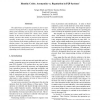Free Online Productivity Tools
i2Speak
i2Symbol
i2OCR
iTex2Img
iWeb2Print
iWeb2Shot
i2Type
iPdf2Split
iPdf2Merge
i2Bopomofo
i2Arabic
i2Style
i2Image
i2PDF
iLatex2Rtf
Sci2ools
109
click to vote
P2P
2003
IEEE
2003
IEEE
Identity Crisis: Anonymity vs. Reputation in P2P Systems
The effectiveness of reputation systems for peer-to-peer resource-sharing networks is largely dependent on the reliability of the identities used by peers in the network. Much debate has centered around how closely one’s pseudoidentity in the network should be tied to their real-world identity, and how that identity is protected from malicious spoofing. In this paper we investigate the cost in efficiency of two solutions to the identity problem for peer-to-peer reputation systems. Our results show that, using some simple mechanisms, reputation systems can provide a factor of 4 to 20 improvement in performance over no reputation system, depending on the identity model used.
P2P 2003 | Peer-to-Peer Computing | Peer-to-peer Reputation Systems | Peer-to-peer Resource-sharing Networks | Reputation System |
| Added | 05 Jul 2010 |
| Updated | 05 Jul 2010 |
| Type | Conference |
| Year | 2003 |
| Where | P2P |
| Authors | Sergio Marti, Hector Garcia-Molina |
Comments (0)

